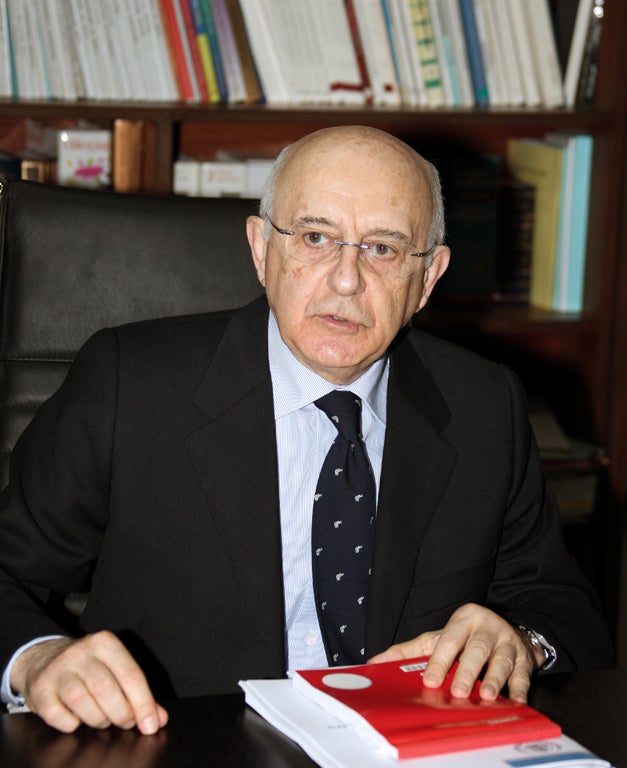Antonio Cassese: Visionary judge who brought war criminals to justice

Antonio Cassese was an internationally renowned Italian judge who headed two international war crimes tribunals.
Often described as a visionary and the principal architect of modern international criminal justice, he served as the first president of the UN-backed Yugoslavia War Crimes Court in The Hague, the first international war crimes tribunal since Nuremberg and Tokyo, and headed the Special Lebanon Tribunal, established to try those accused of the 2005 killing of the Lebanese prime minister Rafik Hariri and 22 others, the first international court with jurisdiction over crimes of terrorism.
In 2004, Cassese was appointed Chairman of the UN International Commission of Inquiry into ethnic cleansing in Darfur. The court eventually issued an arrest warrant for several officials from Sudan, including the president, Omar Hassan al-Bashir. The UN Secretary-General Ban Ki-moon referred to Cassese as "a giant of international law".
Born in Atripalda, in theregion of Campania, southern Italy in 1937, Antonio Cassese had hoped to study philosophy and humanity but on the advice of his father chose law as a more secure option. At the University of Pisa he met his mentor, Giuseppe Sperduti, a member of the European Commission on Human Rights. Cassese went on to become Professor of International Law at Pisa from 1972-74, then joined the University of Florence as Professor until 2008. He was a visiting fellow at All Souls College, Oxford, in 1979 and 1980 and Professor of Law at the European University Institute from 1987-93.
In the late 1960s, Cassese began representing Italy at the UN on committees dedicated to human rights. He became a familiar face in The Hague and gained a reputation as a scholarly and modest judge with an agreeable temperament, but one who was not afraid to criticise others. Sometimes he even criticised fellow judges whom he thought lazy or inefficient. In a 2006 report on the Special Court for Sierra Leone, he monitored the hours the judges worked and said they were taking too many breaks.
In 1993 he was appointed the first President of the International Criminal Tribunal for the Former Yugoslavia, based in The Hague. After his four-year tenure he sat as a tribunal judge until 2000. The tribunal had the power to hand down life sentences but not the death penalty. Cassese believed it represented a "turning point in international relations" as the defendants were not tried by their former enemies but by the international community: "For the first time, the community of states is rendering a justice that is not that of the victors, imposed at the very time when the air is still being rent by the clash of arms and cries of pain."
Although it has been criticised for its sluggishness, Cassese often defended the international justice system, though he was frustrated by the lack of co-operation shown by some world powers in arresting major war crimes figures. The court's job was to try leaders, he said, not "small fry." During his presidency some 77 defendants were indicted, two were sentenced, and two trials remained in process.
Cassese later admitted a degree of naivety and "sheer ignorance." He had taken it "for granted that all countries would immediately arrest those accused by the tribunal." He said that he viewed his tenure as a "significant success tempered by some failings and much frustration." In his office, he displayed photographs of civilian casualties from the Balkan conflicts: "They say all that need be said about why justice must be done."
Cassese believed in the need for continuous debate on international law because it was evolving to reflect the common conscience of mankind. Yet he said it was vital to remain sceptical about harsh laws as, "Laws may and should be improved if they are not up to reality." A constant reminder were the words, on his office wall, of Bertolt Brecht: "I am by nature a man who is difficult to control. I reject with outrage any authority that does not rest on my respect. And I regard laws only as provisional and changeable proposals for regulating human intercourse."
Earlier this month, Cassese stepped down from the Special Tribunal for Lebanon due to ill-health – he had suffered from leukaemia. His successor said, "He was the Maestro, whose towering ability as a jurist and a statesman was equalled by the immense personal warmth and humanity... He created and was the pre-eminent figure in modern international criminal law."
Cassese won many awards, including sharing the 2009 Erasmus Prize. He used the award money to help law students publish their papers.
Antonio Cassese, judge; born Atripalda, Italy 1 January 1937; married 1961 Sylvia Fano (one son, one daughter); died Florence 21 October 2011.
Subscribe to Independent Premium to bookmark this article
Want to bookmark your favourite articles and stories to read or reference later? Start your Independent Premium subscription today.

Join our commenting forum
Join thought-provoking conversations, follow other Independent readers and see their replies